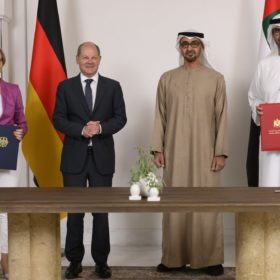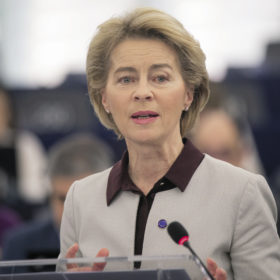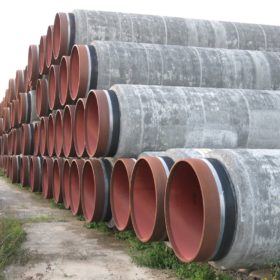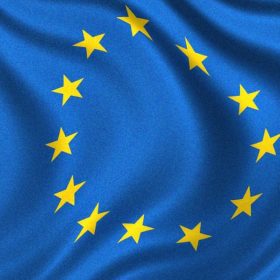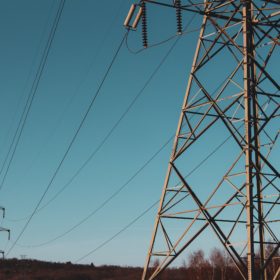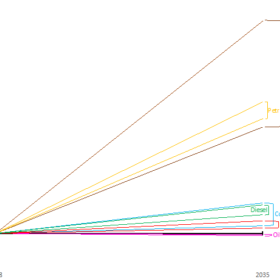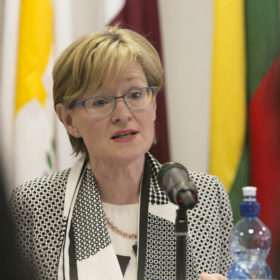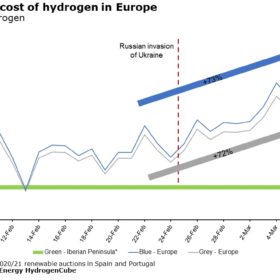Solar, wind compensate for decline of hydro, nuclear in EU electricity output
E3G and Ember said in a new study that solar and wind have helped to mitigate the impacts of drought across the European Union, amid a 21% decline in hydropower generation and a 19% reduction of available nuclear capacity. Wind and solar generated a record 24% of the bloc’s electricity from March to September.
The Hydrogen Stream: GHD Group, Fraunhofer-Gesellschaft win contract for UAE national hydrogen strategy
Germany made efforts this week to expand hydrogen ties with the Gulf states, and Japan announced plans to team up with several nations to ramp up hydrogen production. ICIS, meanwhile, has started offering Europe’s first market-linked renewable hydrogen assessments.
EU proposes €0.18/kWh price cap on solar, wind
European Commission President Ursula Von der Leyen has announced a mandatory electricity usage reduction of at least 5% during peak price hours. Electricity market restructuring measures and a €3 billion ($2.9 billion) investment for a new green hydrogen bank were also on the agenda.
SolarPower Europe at odds with implications of EU windfall tax on renewables
SolarPower Europe has issued a statement opposing any moves by the European Commission to impose a lower maximum electricity price on renewables than on fossil fuel energy. EU member state energy ministers will meet this week to thrash out emergency measures to protect bill payers.
European energy without Russian gas
Scientists in Denmark have modeled the likely impacts of reduced gas supply on the European energy mix up to 2050. Their research finds that if the continent is to achieve the Paris Agreement goal of limiting global average temperature increase to 1.5 C, then gas consumption would need to be heavily reduced, anyway. In less ambitious climate scenarios, however, limited gas supplies could delay the phase-out of coal-fired electricity and lead to longer-term uncertainty over fuel and electricity prices.
Lack of European solar manufacturing could cripple RePower EU bid
Wood Mackenzie says Europe would need to dramatically raise its PV production capability to ensure the 420 GW-plus of new solar it wants this decade does not arrive in the form of Asian panels.
Fluid gas market situation casts shadow over EU energy system models
With each of the 10-year network development plans produced by Europe’s electricity transmission system operators years in the making, the latest such publication may already be out of date as the bloc prepares to fast forward its energy security and climate change ambitions.
Ukraine invasion reshaping discussion about energy, pricing, renewables
Indra Overland, the head of the Center for Energy Research at the Norwegian Institute for International Affairs, tells pv magazine how the Ukraine war is irreversibly changing the global energy landscape, making massive renewables deployment a certainty. But labor issues, equipment shortages, and reliance on Chinese manufacturing remain obstacles.
Commissioner experiences anger of MEPs at definition of gas and nuclear as sustainable
Members of the European Parliament accused Mairead McGuinness and the EU executive of insulting their institution by reversing their vote not to include nuclear in the sustainable investment taxonomy. The commissioner said the divisive energy sources will be needed to keep the lights on.
Invasion of Ukraine an inadvertent boost for green hydrogen
Rystad Energy has joined BloombergNEF with a significant forecast for gray and blue hydrogen off the back of Russia’s invasion of Ukraine. According to the analysts, the impact of the war has sent prices of fossil fuel-tied forms of hydrogen production surging, leaving the gradual but consistent downward price trend of green hydrogen now looking remarkably competitive.

